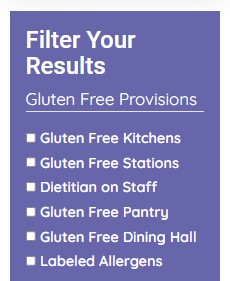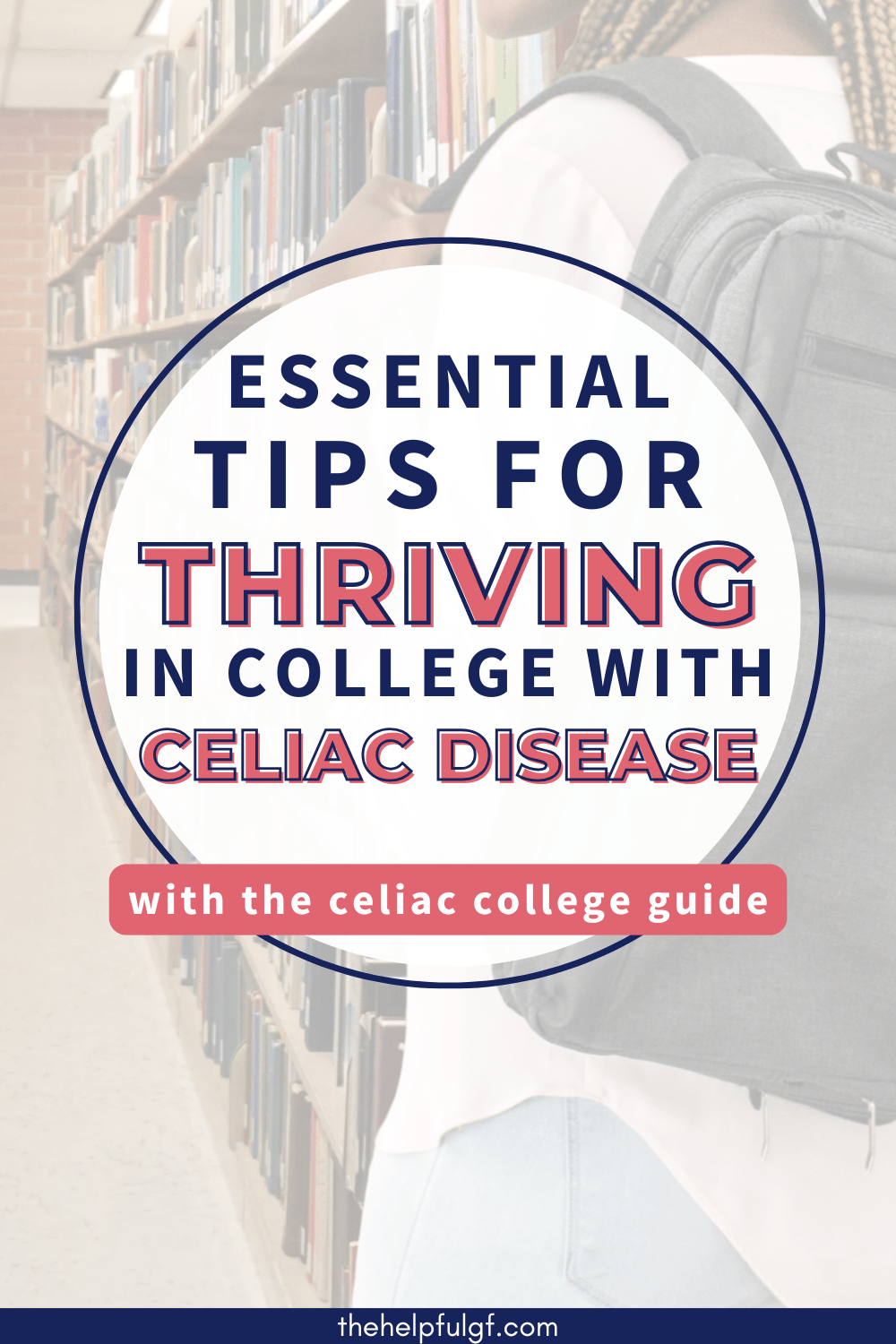Heading off to college is already a major life change, but for students navigating gluten-free in college, trying to find safe gluten-free options can take the stress to a whole new level. As a registered dietitian who works with celiac disease and gut health every day, I know how crucial it is to have access to safe food—not just for health, but to be part of the social scene and keep anxiety in check. That’s why I was so excited to chat with Nicole Kessler, founder of the Celiac College Guide.
This amazing resource is changing the game for students navigating gluten-free life in college.
If you'd prefer to watch our full conversation, I’ve embedded the interview below. But if you’d rather read on, I’m diving into the highlights and practical insights right here.
The gluten-free guide below is based on personal experience and research. Always be sure to discuss any medical changes with your doctor for your personal medical needs. Additionally, this post contains affiliate links. As an Amazon Associate I earn from qualifying purchases. My full disclosure isn’t that interesting, but you can find it here.
🎓 The Reality of Being Gluten-Free in College
When I first learned about Nicole’s work, I was immediately transported back to my husband’s experience navigating college in the early 2000s as someone with celiac disease. Gluten-free options were almost non-existent, and cafeteria meals often involved taking a gamble.
As Nicole shared, some colleges have made great strides since then, while others still leave students scrambling for safe, reliable options.
It's amazing to me that in the current state of understanding we have concerning celiac disease, that research shows more than 50% of students with celiac disease "routinely skip meals at college because they're afraid of getting gluten due to cross-contact risks and the lack of reliable options on campus."
For many, this is their first time living independently, and finding safe food options should not be a barrier to thriving in college. This is not about convenience—it’s a food security issue.
📚 What the Celiac College Guide Offers
The Celiac College Guide is a user-friendly search directory specifically designed to help students and their families identify colleges that offer the best celiac disease accommodations. Whether you’re just beginning your college search or narrowing down choices, this guide has something for everyone. You can filter by a variety of criteria, including school size, location, gluten-free provisions, and more.

I was so impressed when Nicole showed how you can search by gluten-free colleges that have dedicated gluten-free stations or kitchens. The guide even includes detailed profiles for certain schools, verified by the colleges themselves, offering additional information on cross-contact policies, available accommodations, and real-world reviews from students and families.
"We wanted to shine a bright light on those colleges that are doing this really well," Nicole emphasized during our chat. This kind of transparency helps students feel confident they can find a college that really gets their dietary needs.
🔍 How It Works: A Sneak Peek
The guide’s functionality is simple to help you find the best colleges for celiac disease. You can head over to celiaccollegeguide.org and start your search by using filters like school size, acceptance rate, and gluten-free accommodations. You can, for instance, narrow your options to colleges with medium or large campuses that offer gluten-free stations.
The results? A curated list of schools that prioritize student health and safety.
For those who already have a specific college in mind, you can search directly by the school name.
Let’s say you’re curious about Boston College. Simply type it in, and you’ll see a comprehensive overview of their gluten-free provisions, reviews from students, and any additional verified information from the college.

The reviews section of the website is a game-changer! With reports from students across the country about repetitive meal options and staff struggles to meet gluten-free needs, having real-life experiences shared is incredibly helpful.
🏫 Personalizing the College Experience with Celiac Accommodations
One thing that stood out in my conversation with Nicole was the emphasis on personalizing accommodations based on individual needs. While some schools have a fully dedicated gluten-free dining hall, others may offer allergen-free stations covering multiple food sensitivities.
Nicole’s advice? “Always triangulate the information with your own research, and don’t be afraid to ask specific questions about cross-contact policies and ingredient sourcing.”
For many students, accommodations go beyond food availability. The guide also offers resources on seeking meal plan waivers, requesting mini fridges or kitchen access in dorms, and even requesting housing near the dining halls with gluten-free options to facilitate social inclusion.
Nicole rightly pointed out how proximity to safe food can have sweeping social implications, making it easier to build friendships and engage in campus life without added stress.
🍽️ Celiac Disease and College Social Life
Navigating celiac disease in college isn’t just about food—it’s about fostering a full and inclusive experience.
Students often struggle with social isolation due to dietary restrictions, and advocating for oneself is a skill that takes time to develop. In specific research digging into social barriers for students with celiac, it was found that "students reported experiencing cross-contamination issues and reluctance to ask for special food preparation procedures due to fear of being perceived as 'difficult.'"
As a mom and registered dietitian, I was especially touched by Nicole’s insight into this challenge. “So much of college life revolves around eating with peers,” she noted. Ensuring students can participate fully in this aspect of college life is a huge win.
💡 Practical Tips for Navigating Gluten-Free College Life
Nicole shared some of her favorite tips for prospective and current college students with celiac disease:
- Do Your Research: Start by visiting celiaccollegeguide.org and filtering for colleges that fit your criteria.
- Communicate with Colleges Directly: Reach out to dining services and disability offices to confirm specific policies and accommodations.
- Consider Proximity: If only one dining hall accommodates your needs, try to live nearby.
- Plan for Social Situations: Being close to a dedicated gluten-free station makes it easier to socialize and reduces feelings of isolation.
🌟 Join the Community and Share Your Experiences
The Celiac College Guide isn’t just a directory; it’s a growing community resource. Nicole and her team rely on feedback from students and families (like you!) to keep the guide accurate and up-to-date.
If you’re a current student or have a child in college, consider leaving a review on the website. As Nicole mentioned, “Your input can truly make a difference for future students and families.”
The guide also features a helpful accommodations guide, which includes free resources and suggestions for making the transition to college life with celiac disease smoother. I highly recommend checking it out, even if you’re already in college and just need a little extra support.
❤️ A Resource That Changes Lives
The Celiac College Guide is more than just a tool—it’s a real lifesaver for families and students trying to make gluten-free college life easier
If you or someone you love is preparing for the college journey with celiac disease, check out the Celiac College Guide here. It’s a fantastic resource that can make all the difference in helping students thrive and feel supported throughout their college experience.
Did you find this overview of the Celiac College Guide helpful?
If so, share the love! Use the social sharing buttons below to post to your favorite social platforms or pin to Pinterest and spread the word about this resource.
📚 Other articles on living gluten-free you'll love









Leave a Reply